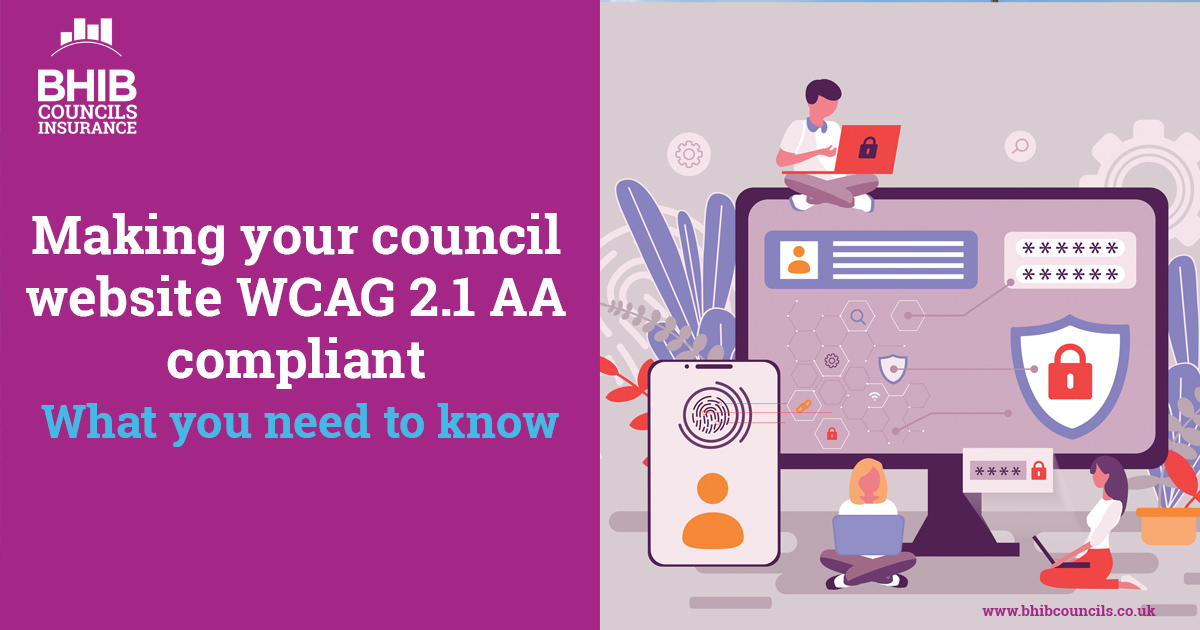The deadline for public bodies – including local and parish councils – to make their websites WCAG 2.1 AA compliant passed on the 23 September 2020.
If you are still unsure about what your council needs to do in order to comply with these regulations, we have put together the below guide to explain everything as simply as possible.
Quick links
- What is WCAG Website Compliance?
- What are the WCAG 2.1AA guidelines?
- What you need to be WCAG 2.1AA compliant
- Are there any exemptions from the regulations?
- How will the accessibility guidelines be monitored and enforced?
- What if my council doesn’t have the resources or money to update our website?
- How to check if your website is WCAG 2.1 AA compliant?
What is WCAG Website Compliance?
Back in March 2018 the UK Government set out new accessibility guidelines for public sector bodies, called: The Public Sector Bodies (Websites & Mobile Applications No.2) Accessibility Regulations 2018.
The aim of the new regulations is to make sure that all public sector websites and mobile apps are accessible to all users – especially those with disabilities.
The regulations state that by September 2020 all parish, town and borough councils must have a website that complies with the Website Content Accessibility Guidelines (WCAG) 2.1 AA rating.
WCAG has three different rating levels – A, AA and AAA – and the regulations require public body websites to at least meet the AA rating as a minimum standard.
What are the WCAG 2.1AA guidelines?
The WCAG 2.1 guidelines are an internationally recognised set of recommendations for improving the accessibility of the web. You can see the guidelines in full here: https://www.w3.org/TR/WCAG21/
The guidelines explain how to make websites and apps accessible to everyone, including users with impairments to their:
- Vision – those who are severely sight impaired (blind), partially sighted or colour blind
- Hearing – those who are deaf or hard of hearing
- Mobility – those who may find it difficult to use a mouse or keyboard
- Thinking or understanding – for example, those who are dyslexic, autistic or have learning difficulties
What you need to be WCAG 2.1AA compliant
In order to comply with the new accessibility guidelines, a public body such as a local or town council must have:
- A website compliant to the WCAG 2.1 AA standard
- An Accessibility Policy Statement that follows a standard format
- An Accessible Documents statement that follows a standard format
- A process in place to regularly monitor and review the website
- A process to provide requests for content that is not in a compliant format
Are there any exemptions from the regulations?
Although the Government wants all public bodies to meet the regulations so that important information and online services can be accessed by all, the following organisations are exempt:
- Non-government organisations like charities – unless they are primarily financed by public funding, provide services that are essential to the public or aimed at disabled people
- Public sector broadcasters and their subsidiaries
Also, the following organisations are partially exempt from the accessibility regulations:
- Primary/secondary schools and nurseries – except any content that people need to use their services (forms to outline school meal preferences etc.)
However, organisations that are partially exempt are still required to publish an accessibility statement on their website.
If you are unsure whether the new accessibility guidelines apply to you, check with your legal advisor or compliance officer.
How will the accessibility guidelines be monitored and enforced?
The Government Digital Service (GDS) will monitor the compliance of public sector bodies by examining a sample of websites every year. The GDS can ask for information and request access to any public sector website, intranet or extranet.
Public sector bodies are also required to publish an accessibility statement and review this regularly.
If the GDS rules that a public sector body has failed to publish an accessibility statement or that the accessibility statement is not accurate it will publish the name of the body/council and a copy of the decision.
In terms of enforcement of the regulations, this will be lead by the Equality and Human Rights Commission (EHRC) in England, Scotland and Wales and the Equality Commission for Northern Ireland (ECNI) in Northern Ireland.
Organisations that fail to meet the accessibility requirements, or who fail to provide a satisfactory response to a request to produce information in an accessible format, will be in breach of the Equality Act 2010 and the Disability Discrimination Act 1995.
The EHRC and ECNI can therefore use their legal powers against offending organisations, including investigations, unlawful act notices and court action.
What if my council doesn’t have the resources or money to update our website?
The regulations do contain some “leeway” for organisations who deem that the impact of fully meeting the WCAG 2.1AA guidelines is too much for them to cope with. This is referred to as a ‘disproportionate burden’.
If you want to declare that making particular changes to your website it a disproportionate burden than you are legally required to carry out an assessment that weighs up:
- The burden that making the changes place on your organisation
- The benefits that making the changes will bring
You will also need to take into account:
- The size of your organisation and the resources you have available
- The nature of your organisation (i.e. do you offer services to people who are likely to have a disability/impairment)
- How much it would cost to make your website accessible and the overall impact this expense would have on your organisation
- How much disabled users would benefit from if your website was more accessible
How to check if your website is WCAG 2.1 AA compliant?
If you are not sure if your website is currently accessible, there are some free online tools you can use to quickly check.
Visit any of the below websites and you can run your own accessibility check on your website and identify any potential issues:
If you find that there are problems with your council website and it needs improving, you will need to talk to your web developer or web company and get their thoughts on what is required to make your website more accessible.
For more information, see the Government’s full guidance: Understanding accessibility requirements for public sector bodies
Specialist Insurance for Local Councils
We are passionate about delivering tailored insurance solutions for Local Councils.





